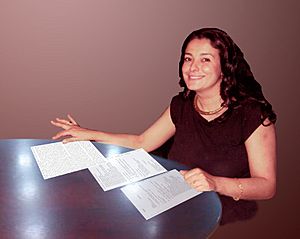Anna Pujol Puigvehi facts for kids
Anna Pujol Puigvehí is a famous historian, professor, and archaeologist from Figueres, Catalonia, Spain. She was born on August 16, 1947. She has spent her life studying history and ancient cultures.
She earned her first degree in 1970 from the University of Barcelona. Later, in 1981, she received her highest degree (a doctorate) in History from the Autonomous University of Barcelona. Her research focused on the ancient people who lived in northeastern Spain before the Romans arrived.
Anna Pujol Puigvehí has taught at universities for many years. She was a professor at the Autonomous University of Barcelona for over 15 years. She also taught Archaeology and Ancient History at the UOC (Open University of Catalonia). In 1981, she became a full professor of History for high schools.
Contents
What Does an Archaeologist Do?
As an archaeologist, Anna Pujol Puigvehí has worked on many exciting digs. She has taught special courses in Empuries, an ancient Greek and Roman city in Spain. She also worked with teams from France and Spain at important sites.
Famous Dig Sites
- Cancho Roano: This is an ancient palace in Spain.
- Bibracte: This was a large Gallo-Roman town in France.
She has also explored many other sites across Spain, Catalonia (like Ullastret and Ampurias), and other parts of Europe. These places include Saint-Remy-de-Provence, Bourges, Bordighera, and Liguria.
Sharing Knowledge About Archaeology
Because she loves teaching archaeology, Anna Pujol Puigvehí helped organize special conferences. These were called the "Conference on Archaeology and Education." They took place at the Museum of Archaeology of Catalonia in 1994 and 1996.
She also worked on a computer program for education. This program, called "The Iberians of Catalonia," teaches about the ancient Iberian people. It is available for free online from the Department of Education of the Generalitat of Catalonia.
Anna Pujol Puigvehí's Research and Writings
Anna Pujol Puigvehí is a scientific advisor for the Amics dels Museus de Catalunya (Friends of the Museums of Catalonia) association since 1974. She has also been a scientific helper for the Spanish Historical Index since 1973. She is part of several important groups, including the Institute of Catalan Studies.
She has taught many advanced courses at universities and other places in Spain and abroad. She has written many articles and books about the early history of Catalonia and Europe. Some of her writings are for experts, and others are for everyone to read.
Where Her Work Appears
Her articles have been published in well-known magazines and journals, such as:
- Ampurias
- Extremeños Studies Journal
- Annals of the Institute of Empordan Studies
- Pyrenae
- History and Life
- History 16
- World Routes the National Geographic Society
- Archaeology Magazine
- Scientific American
Awards and Recognitions
Anna Pujol Puigvehí received the Third Prize Castell del Joncar from the Figueres City Council. This was for her historical research on "The Ampurdan from the Greek colonization to the Roman conquest." This study was based on her earlier work and was published in Annals de l’Institut d’Estudis Empordanesos in 1977.
Main Areas of Study
Her work as a researcher and writer covers three main areas:
- Early History of Catalonia and Europe: She studies the very first periods of history in these regions.
- Roots of Catalan Cuisine: She explores the history of food and drink in Catalonia. For example, she wrote about how wine was brought to and sold in northeastern Spain in ancient times.
- Translations: She translates important books and studies related to history and architecture. These include books like History of architectural typologies and History of Modern Architecture, which are used by students at the School of Architecture of Barcelona.
See also
 In Spanish: Anna Pujol Puigvehí para niños
In Spanish: Anna Pujol Puigvehí para niños


